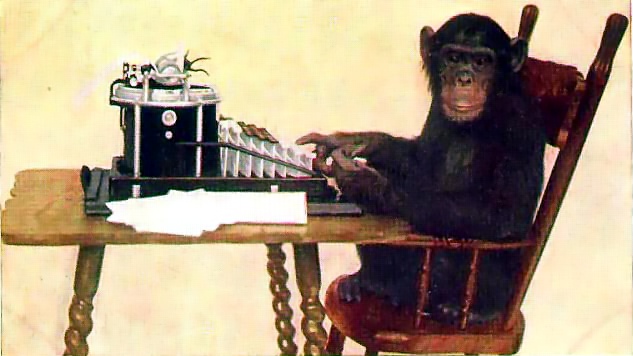Here is a quote that I learned today, is true, and is relevant to the pointlessness that is this blog:
We've all heard that a million monkeys banging on a million typewriters will eventually reproduce the entire works of Shakespeare. Now, thanks to the Internet, we know this is not true.-- Robert Wilensky, 1996
Kyle tells me that it is actually 1,000 monkeys for 1,000 years. Being a math whiz, I retorted that a million monkeys could get done in one year what 1,000 could get done in 1. Now, I have looked up the history of this adage, figuring we needed to get the numbers right.
So apparently the original point of the quote was that the monkeys would not recreate Shakespeare:
Concevons qu'on ait dressé un million de singes à frapper au hasard sur les touches d'une machine à écrire et que, sous la surveillance de contremaîtres illettrés, ces singes dactylographes travaillent avec ardeur dix heures par jour avec un million de machines à écrire de types variés. Les contremaîtres illettrés rassembleraient les feuilles noircies et les relieraient en volumes. Et au bout d'un an, ces volumes se trouveraient renfermer la copie exacte des livres de toute nature et de toutes langues conservés dans les plus riches bibliothèques du monde. Telle est la probabilité pour qu'il se produise pendant un instant très court, dans un espace de quelque étendue, un écart notable de ce que la mécanique statistique considère comme la phénomène le plus probable...-- Borel, 1913
Now, to prove my wizardry in all subjects (math + French = all, right?), I will attempt to translate for you! This says that it is as likely for a million monkeys at typewriters for 10 hours per day for 1 year to reproduce all books in any library in the world as for us to observe a deviation from that which statistical mechanics predicts to be the most probable phenomenon. So, Borel knew what he was talking about with the monkeys. By the way, this is Borel as in Borel set. Anyways, according to my single source, Parable of the Monkeys, it is this Sir Jeans guy who first started going the wrong way with the monkeys in 1930. He says he heard we needed:
six monkeys, set to strum unintelligently on typewriters for millions of millions of years ... to write all the books in the British Museum.By the way, the math is worked out on Wikipedia if we assume uniformly distributed, independent events (talk about unrealistic probabilistic assumptions!):
If we set the number of monkeys equal to the number of particles in the observable universe, 1080, typing 1000 keystrokes per second for 100 times the life of the universe (1020 seconds), the probability of the monkeys duplicating even a short book approaches zero.and
Even if the observable universe were filled with monkeys typing for all time, their total probability to produce a single instance of Hamlet would still be less than one in 10183,800Also, we apparently would need 10 billion monkeys just to be more likely than not to get the word "banana".
Anyways, I don't know where I'm going with this. I just know I know way too much about monkeys and typewriters now. Also, this is funny, and a great use of 2,000 pounds:
Yeah, you should just read the article on Wikipedia. I will stop quoting it now.In 2003, lecturers and students from the University of Plymouth MediaLab Arts course used a £2,000 grant from the Arts Council to study the literary output of real monkeys. They left a computer keyboard in the enclosure of six Celebes Crested Macaques in Paignton Zoo in Devon in England for a month, with a radio link to broadcast the results on a website. One researcher, Mike Phillips, defended the expenditure as being cheaper than reality TV and still "very stimulating and fascinating viewing".[28]
Not only did the monkeys produce nothing but five pages[29] consisting largely of the letter S, the lead male began by bashing the keyboard with a stone, and the monkeys continued by urinating and defecating on it. The zoo's scientific officer remarked that the experiment had "little scientific value, except to show that the 'infinite monkey' theory is flawed". Phillips said that the artist-funded project was primarily performance art, and they had learned "an awful lot" from it. He concluded that monkeys "are not random generators. They're more complex than that. … They were quite interested in the screen, and they saw that when they typed a letter, something happened. There was a level of intention there."[28][30]
This reminds me of my idea of the day inspired by The Sheep Market, for coming up with ridiculous projects for Mechanical Turkers to do for a total of $20. I have $20 and am taking suggestions.




No comments:
Post a Comment